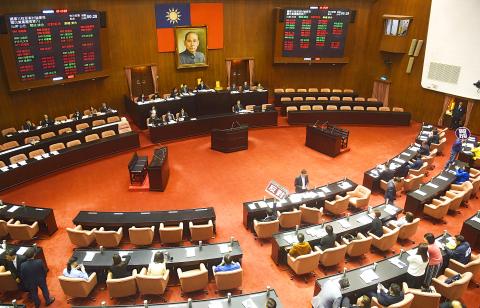A “same-sex union” bill drafted by HTC chairwoman Cher Wang’s (王雪紅) Faith, Hope and Love Foundation and sponsored by Democratic Progressive Party (DPP) Legislator Lin Tai-hua (林岱樺) yesterday advanced to a second reading.
The DPP caucus at a plenary session successfully moved to advance the bill, titled the “draft enforcement act for Judicial Yuan Interpretation No. 748 and Referendum No. 12,” to a second reading.
The New Power Party caucus filed a separate motion to return the bill to the Procedural Committee, which was struck down.

Photo: Huang Yao-cheng, Taipei Times
The result was in line with a decision reached during cross-caucus negotiations on Thursday that all three bills on the issue be reviewed side-by-side during another round of negotiations.
DPP caucus whip Ker Chien-ming (柯建銘) said that the next round of negotiations could begin next week, as the deadline set by the interpretation nears.
It is to be reviewed alongside the Executive Yuan’s “enforcement act of Judicial Yuan Interpretation No. 748” and another sponsored by Chinese Nationalist Party (KMT) Legislator Lai Shyh-bao (賴士葆) on behalf of the conservative Happiness of the Next Generation Alliance, both of which proceeded to a second reading in March.
Referendum No. 12, which was voted on alongside the nine-in-one elections on Nov. 24 last year, asked voters: “Do you agree that the right to persons of the same sex to create a permanent union should be guaranteed by an institution other than marriage as defined by the Civil Code?”
It passed after garnering 6.4 million “yes” votes to 4.07 million “no” votes.
Lin’s version of the bill uses the term “same-sex union,” while the Cabinet’s version uses “same-sex marriage.”
The latter is in line with the Council of Grand Justices’ interpretation passed on May 24, 2017, which declared the lack of language guaranteeing the right of same-sex couples to get married in the Civil Code unconstitutional, and required that a law or amendment be introduced to legalize same-sex marriage within two years.
Although supporters of Lin’s version have said that it is a compromise between the other two versions, DPP legislators Yu Mei-nu (尤美女) and Tuan Yi-kang (段宜康) said otherwise.
Yu on Thursday called Lin’s version “stark discrimination” against same-sex couples.
The version contains a “fake marriage” clause that would authorize prosecutors or social welfare agencies to request that a court intervene and abrogate a same-sex union if relatives within three degrees of consanguinity of either member of the union believe that it was not for the purpose of two people “living life together,” Yu said on Facebook, questioning what right people have to scrutinize the sincerity of others’ marriage.
The version also has a clause that says: “As one’s conscience and freedom should not be affected by the enactment of this act, conveying or inculcating beliefs against the relationship described in Article 2 [same-sex union] does not constitute discrimination,” she said.
Tuan said that he despises all lawmakers who sponsored or cosponsored the bill, regardless of their party affiliation.

MAKING WAVES: China’s maritime militia could become a nontraditional threat in war, clogging up shipping lanes to prevent US or Japanese intervention, a report said About 1,900 Chinese ships flying flags of convenience and fishing vessels that participated in China’s military exercises around Taiwan last month and in January have been listed for monitoring, Coast Guard Administration (CGA) Deputy Director-General Hsieh Ching-chin (謝慶欽) said yesterday. Following amendments to the Commercial Port Act (商港法) and the Law of Ships (船舶法) last month, the CGA can designate possible berthing areas or deny ports of call for vessels suspected of loitering around areas where undersea cables can be accessed, Oceans Affairs Council Minister Kuan Bi-ling (管碧玲) said. The list of suspected ships, originally 300, had risen to about 1,900 as

Japan’s strategic alliance with the US would collapse if Tokyo were to turn away from a conflict in Taiwan, Japanese Prime Minister Sanae Takaichi said yesterday, but distanced herself from previous comments that suggested a possible military response in such an event. Takaichi expressed her latest views on a nationally broadcast TV program late on Monday, where an opposition party leader criticized her for igniting tensions with China with the earlier remarks. Ties between Japan and China have sunk to the worst level in years after Takaichi said in November that a hypothetical Chinese attack on Taiwan could bring about a Japanese

MORE RESPONSIBILITY: Draftees would be expected to fight alongside professional soldiers, likely requiring the transformation of some training brigades into combat units The armed forces are to start incorporating new conscripts into combined arms brigades this year to enhance combat readiness, the Executive Yuan’s latest policy report said. The new policy would affect Taiwanese men entering the military for their compulsory service, which was extended to one year under reforms by then-president Tsai Ing-wen (蔡英文) in 2022. The conscripts would be trained to operate machine guns, uncrewed aerial vehicles, anti-tank guided missile launchers and Stinger air defense systems, the report said, adding that the basic training would be lengthened to eight weeks. After basic training, conscripts would be sorted into infantry battalions that would take

DEEP-STRIKE CAPABILITY: The scenario simulated a PLA drill that turned into an assault on Taiwan’s critical infrastructure, with the launchers providing fire support Taiwan yesterday conducted this year’s first military exercises at Longsiang Base in Taichung, demonstrating the newly acquired High Mobility Artillery Rocket System’s (HIMARS) ability to provide fire support and deep-strike capabilities. The scenario simulated an attack on Penghu County, with HIMARS trucks immediately rolling into designated launch areas and firing barrages at the Wangan (望安) and Cimei (七美) islands, simulating the provision of fire support against invading forces. The HIMARS are supposed to “fire and leave,” which would significantly increase personnel and equipment survivability, a military official said. The drill simulated an exercise launched by the Chinese People’s Liberation Army (PLA) Eastern